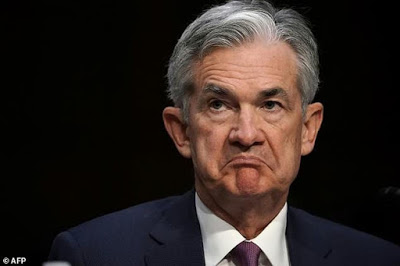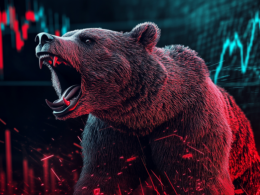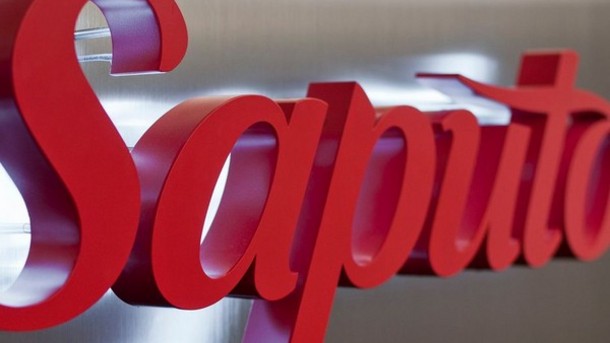by Michael Lebowitz, CFA, 720 Global Research
Since President Trump first discussed firing Jerome Powell, out of a sense of frustration that his Fed Chair pick was not dovish enough, he has regularly expressed his displeasure at Powell’s lack of willingness to do whatever it takes to keep the economy booming beyond its potential. Strong economic growth serves Trump well as it boosts the odds of winning a second term.
[backc url='https://sendy.advisoranalyst.com/w/JYLmDqsFPB5F892UoC9DLyNw/g1892M8idNVuKzDuIVOSrnsQ/Ojy33NNShVjYmv763jkhZOnw']This thought of firing the Fed Chair took an interesting turn yesterday when Mario Draghi, Jerome Powell’s counter-part in the ECB, commented that he was open to lowering interest rates and expanding quantitative easing measures if economic growth in the E.U. didn’t start to pick up soon.
This led to the following Trump tweet:
Mario Draghi just announced more stimulus could come, which immediately dropped the Euro against the Dollar, making it unfairly easier for them to compete against the USA. They have been getting away with this for years, along with China and others.
— Donald J. Trump (@realDonaldTrump) June 18, 2019
The bottom line is that the ECB will push Trump harder to lean on the Fed to be more aggressive with lower rates and QE. Trump’s urgency for Fed action also increases the odds that Powell could be replaced or demoted, as such a discussion was rumored to have been discussed. Look for fireworks on Trumps Twitter page today if the Fed does not take a dovish tact. We remind you:
“Powell’s my pick — and I disagree with him entirely,” Trump said last week in an interview with ABC News.
“Frankly, if we had a different person in the Federal Reserve that wouldn’t have raised interest rates so much we would have been at least a point and a half higher.”
The following article was published last October and is even more relevant today. If Powell becomes an impediment to aggressive Federal Reserve policy and therefore hurts Trump’s chances of winning in 2020, we might just see Chairman Powell get fired or demoted. Is that possible?
On Donald Trump’s hit TV show, The Apprentice, contestants competed to be Trump’s chief apprentice. Predictably, each show ended when the field of contestants was narrowed down by the firing of a would-be apprentice. While the show was pure entertainment, we suspect Trump’s management style was on full display. Trump has run private organizations his entire career. Within these organizations, he had a tremendous amount of unilateral control. Unlike what is required in the role of President or that of a corporate executive for a public company, Trump largely did what he wanted to do.
On numerous occasions, Trump has claimed the stock market is his “mark-to-market.” In other words, the market is the barometer of his job performance. We think this is a ludicrous comment and one that the President will likely regret. He has made this comment on repeated occasions, leading us to conclude that, whether he believes it or not, he has tethered himself to the market as a gauge of performance in the mind of the public. We have little doubt that the President will do everything in his power to ensure the market does not make him look bad.
Warning Shots Across the Bow
On June 29, 2018, Trump’s Economic Advisor Lawrence Kudlow delivered a warning to Chairman Powell saying he hoped that the Federal Reserve (Fed) would raise interest rates “very slowly.”
Almost a month later we learned that Kudlow was not just speaking for himself but likely on behalf of his boss, Donald Trump. During an interview with CNBC, on July 20, 2018, the President expanded on Kudlow’s comments voicing concern with the Fed hiking interest rates. Trump told CNBC’s Joe Kernen that he does not approve [of rate hikes], even though he put a “very good man in” at the Fed referring to Chairman Jerome Powell.
“I’m not thrilled,” Trump added. “Because we go up and every time you go up they want to raise rates again. I don’t really — I am not happy about it. But at the same time I’m letting them do what they feel is best.”
“As of this moment, I would not see that this would be a big deal yet but on the other hand it is a danger sign,” he said.
Two months later in August of 2018, Bloomberg ran the following article:
Trump Said to Complain Powell Hasn’t Been Cheap-Money Fed Chair
“President Donald Trump said he expected Jerome Powell to be a cheap-money Fed chairman and lamented to wealthy Republican donors at a Hamptons fundraiser on Friday that his nominee instead raised interest rates, according to three people present.”
On October 10, 2018, following a 3% sell-off in the equity markets, CNBC reported on Donald Trump’s most harsh criticism of the Fed to date. Trump said, “I think the Fed is making a mistake. They’re so tight. I think the Fed has gone crazy.”
Again-“I think the Fed has gone crazy”
These comments and others come as the Fed is publicly stating their preference for multiple rate hikes and further balance sheet reduction in the coming 12-24 months. The markets, as discussed in our article Everyone Hears the Fed but Few are Listening, are not priced for the same expectations. This is becoming evident with the pickup in volatility in the stock and bond markets. There is little doubt that a hawkish tone from Chairman Powell and other governors will increasingly wear on an equity market that is desperately dependent on ultra-low interest rates.
Who can stop the Fed?
We think there is an obstacle that might stand in the Fed’s way of further rate hikes and balance sheet reductions.
Consider a scenario where the stock market drops 20-25% or more, and the Fed continues raising rates and maintaining a hawkish tenor.
We believe this scenario is well within the realm of possibilities. Powell does not appear to be like Yellen, Bernanke or Greenspan with a finger on the trigger ready to support the markets at early signs of disruption. In his most recent press conference on September 26, 2018, Powell mentioned that the Fed would react to the stock market but only if the correction was both “significant” and “lasting.”
The word “significant” suggests he would need to see evidence of such a move causing financial instability. “Lasting” implies Powell’s reaction time to such instability will be much slower than his predecessors. Taken along with his 2013 comments that low rates and large-scale asset purchases (QE) “might drive excessive risk-taking or cause bubbles in financial assets and housing” further seems to support the notion that he would be slow to react.
Implications
President Trump’s ire over Fed policy will likely boil over if the Fed sits on their hands while the President’s popularity “mark-to-market” is deteriorating.
This leads us to a question of utmost importance. Can the President of the United States fire the Chairman of the Fed? If so, what might be the implications?
The answer to the first question is yes. Pedro da Costa of Business Insider wrote on this topic. In his article (link) he shared the following from the Federal Reserve Act (link):
Given that the President can fire the Fed Chairman for “cause” raises the question of implications were such an event to occur. The Fed was organized as a politically independent entity. Congress designed it this way so that monetary policy would be based on what is best for the economy in the long run and not predicated on the short-term desires of the ruling political party and/or President.
Although a President has never fired a Fed Chairman since its inception in 1913, the Fed’s independence has been called into question numerous times. In the 1960’s, Lyndon Johnson is known to have physically pushed Fed Chairman William McChesney Martin around the Oval Office demanding that he ease policy. Martin acquiesced. In the months leading up to the 1972 election, Richard Nixon used a variety of methods including verbal threats and false leaks to the press to influence Arthur Burns toward a more dovish policy stance.
If hawkish Fed policy actions, as proposed above, result in a large market correction and Trump were to fire Fed Chairman Jerome Powell, it is plausible that the all-important veil of Fed independence would be pierced. Although pure conjecture, it does not seem unreasonable to consider what Trump might do in the event of a large and persistent market drawdown. Were he to replace the Fed chair with a more loyal “team player” willing to introduce even more drastic monetary actions than seen over the last ten years, it would certainly add complexity and risk to the economic outlook. The precedent for this was established when President Trump recently nominated former Richmond Fed advisor and economics professor Marvin Goodfriend to fill an open position on the Fed’s Board of Governors. Although Goodfriend has been critical of bond buying programs, “he (Goodfriend) has a radical willingness to embrace deeply negative rates.” –The Financial Times
Such a turn of events might initially be very favorable for equity markets, but would likely raise doubts about market values for many investors and raise serious questions about the integrity of the U.S. dollar. Lowering rates even further leaves the U.S. debt problem unchecked and potentially unleashes inflation, a highly toxic combination. A continuation of overly dovish policy would likely bolster further expansion of debt well beyond the nation’s ability to service it. Additionally, if inflation did move higher in response, bond markets would no doubt eventually respond by driving interest rates higher. The can may be kicked further but the consequences, both current and future, will become ever harsher.
Copyright © 720 Global Research














